The Art of Being a Scientist
A Guide for Graduate Students and their Mentors
Nonfiction, Science & Nature, Science, Earth Sciences, Technology| Author: | Roel Snieder, Ken Larner | ISBN: | 9781107263956 |
| Publisher: | Cambridge University Press | Publication: | July 23, 2009 |
| Imprint: | Cambridge University Press | Language: | English |
| Author: | Roel Snieder, Ken Larner |
| ISBN: | 9781107263956 |
| Publisher: | Cambridge University Press |
| Publication: | July 23, 2009 |
| Imprint: | Cambridge University Press |
| Language: | English |
This is a hands-on guide for graduate students and young researchers wishing to perfect the practical skills needed for a successful research career. By teaching junior scientists to develop effective research habits, the book helps to make the experience of graduate study a more efficient and rewarding one. The authors have taught a graduate course on the topics covered for many years, and provide a sample curriculum for instructors in graduate schools wanting to teach a similar course. Topics covered include choosing a research topic, department, and advisor; making workplans; the ethics of research; using scientific literature; perfecting oral and written communication; publishing papers; writing proposals; managing time effectively; and planning a scientific career and applying for jobs in research and industry. The wealth of advice is invaluable to students, junior researchers and mentors in all fields of science, engineering, and the humanities. The authors have taught a graduate course on the topics covered for many years, and provide a sample curriculum for instructors in graduate schools wanting to teach a similar course. The sample curriculum is available in the book as Appendix B, and as an online resource.
This is a hands-on guide for graduate students and young researchers wishing to perfect the practical skills needed for a successful research career. By teaching junior scientists to develop effective research habits, the book helps to make the experience of graduate study a more efficient and rewarding one. The authors have taught a graduate course on the topics covered for many years, and provide a sample curriculum for instructors in graduate schools wanting to teach a similar course. Topics covered include choosing a research topic, department, and advisor; making workplans; the ethics of research; using scientific literature; perfecting oral and written communication; publishing papers; writing proposals; managing time effectively; and planning a scientific career and applying for jobs in research and industry. The wealth of advice is invaluable to students, junior researchers and mentors in all fields of science, engineering, and the humanities. The authors have taught a graduate course on the topics covered for many years, and provide a sample curriculum for instructors in graduate schools wanting to teach a similar course. The sample curriculum is available in the book as Appendix B, and as an online resource.















